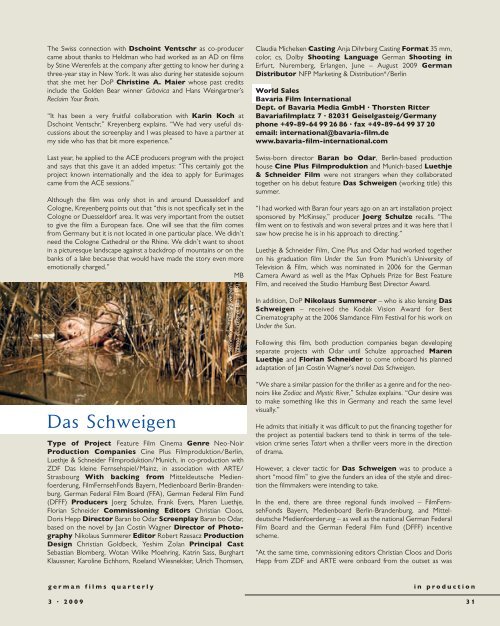KODAK VISION3 250D Color Negative Film 5207/7207 - German Film
KODAK VISION3 250D Color Negative Film 5207/7207 - German Film
KODAK VISION3 250D Color Negative Film 5207/7207 - German Film
Create successful ePaper yourself
Turn your PDF publications into a flip-book with our unique Google optimized e-Paper software.
The Swiss connection with Dschoint Ventschr as co-producer<br />
came about thanks to Heldman who had worked as an AD on films<br />
by Stine Werenfels at the company after getting to know her during a<br />
three-year stay in New York. It was also during her stateside sojourn<br />
that she met her DoP Christine A. Maier whose past credits<br />
include the Golden Bear winner Grbavica and Hans Weingartner’s<br />
Reclaim Your Brain.<br />
“It has been a very fruitful collaboration with Karin Koch at<br />
Dschoint Ventschr,” Kreyenberg explains. “We had very useful discussions<br />
about the screenplay and I was pleased to have a partner at<br />
my side who has that bit more experience.”<br />
Last year, he applied to the ACE producers program with the project<br />
and says that this gave it an added impetus: “This certainly got the<br />
project known internationally and the idea to apply for Eurimages<br />
came from the ACE sessions.”<br />
Although the film was only shot in and around Duesseldorf and<br />
Cologne, Kreyenberg points out that “this is not specifically set in the<br />
Cologne or Duesseldorf area. It was very important from the outset<br />
to give the film a European face. One will see that the film comes<br />
from <strong>German</strong>y but it is not located in one particular place. We didn’t<br />
need the Cologne Cathedral or the Rhine. We didn’t want to shoot<br />
in a picturesque landscape against a backdrop of mountains or on the<br />
banks of a lake because that would have made the story even more<br />
emotionally charged.”<br />
MB<br />
Das Schweigen<br />
Scene from “Das Schweigen”<br />
(photo courtesy of Blond PR)<br />
Type of Project Feature <strong>Film</strong> Cinema Genre Neo-Noir<br />
Production Companies Cine Plus <strong>Film</strong>produktion/Berlin,<br />
Luethje & Schneider <strong>Film</strong>produktion/Munich, in co-production with<br />
ZDF Das kleine Fernsehspiel/Mainz, in association with ARTE/<br />
Strasbourg With backing from Mitteldeutsche Medienfoerderung,<br />
<strong>Film</strong>FernsehFonds Bayern, Medienboard Berlin-Brandenburg,<br />
<strong>German</strong> Federal <strong>Film</strong> Board (FFA), <strong>German</strong> Federal <strong>Film</strong> Fund<br />
(DFFF) Producers Joerg Schulze, Frank Evers, Maren Luethje,<br />
Florian Schneider Commissioning Editors Christian Cloos,<br />
Doris Hepp Director Baran bo Odar Screenplay Baran bo Odar,<br />
based on the novel by Jan Costin Wagner Director of Photography<br />
Nikolaus Summerer Editor Robert Rzesacz Production<br />
Design Christian Goldbeck, Yeshim Zolan Principal Cast<br />
Sebastian Blomberg, Wotan Wilke Moehring, Katrin Sass, Burghart<br />
Klaussner, Karoline Eichhorn, Roeland Wiesnekker, Ulrich Thomsen,<br />
Claudia Michelsen Casting Anja Dihrberg Casting Format 35 mm,<br />
color, cs, Dolby Shooting Language <strong>German</strong> Shooting in<br />
Erfurt, Nuremberg, Erlangen, June – August 2009 <strong>German</strong><br />
Distributor NFP Marketing & Distribution*/Berlin<br />
World Sales<br />
Bavaria <strong>Film</strong> International<br />
Dept. of Bavaria Media GmbH · Thorsten Ritter<br />
Bavariafilmplatz 7 · 82031 Geiselgasteig/<strong>German</strong>y<br />
phone +49-89-64 99 26 86 · fax +49-89-64 99 37 20<br />
email: international@bavaria-film.de<br />
www.bavaria-film-international.com<br />
Swiss-born director Baran bo Odar, Berlin-based production<br />
house Cine Plus <strong>Film</strong>produktion and Munich-based Luethje<br />
& Schneider <strong>Film</strong> were not strangers when they collaborated<br />
together on his debut feature Das Schweigen (working title) this<br />
summer.<br />
“I had worked with Baran four years ago on an art installation project<br />
sponsored by McKinsey,” producer Joerg Schulze recalls. “The<br />
film went on to festivals and won several prizes and it was here that I<br />
saw how precise he is in his approach to directing.”<br />
Luethje & Schneider <strong>Film</strong>, Cine Plus and Odar had worked together<br />
on his graduation film Under the Sun from Munich’s University of<br />
Television & <strong>Film</strong>, which was nominated in 2006 for the <strong>German</strong><br />
Camera Award as well as the Max Ophuels Prize for Best Feature<br />
<strong>Film</strong>, and received the Studio Hamburg Best Director Award.<br />
In addition, DoP Nikolaus Summerer – who is also lensing Das<br />
Schweigen – received the Kodak Vision Award for Best<br />
Cinematography at the 2006 Slamdance <strong>Film</strong> Festival for his work on<br />
Under the Sun.<br />
Following this film, both production companies began developing<br />
separate projects with Odar until Schulze approached Maren<br />
Luethje and Florian Schneider to come onboard his planned<br />
adaptation of Jan Costin Wagner’s novel Das Schweigen.<br />
“We share a similar passion for the thriller as a genre and for the neonoirs<br />
like Zodiac and Mystic River,” Schulze explains. “Our desire was<br />
to make something like this in <strong>German</strong>y and reach the same level<br />
visually.”<br />
He admits that initially it was difficult to put the financing together for<br />
the project as potential backers tend to think in terms of the television<br />
crime series Tatort when a thriller veers more in the direction<br />
of drama.<br />
However, a clever tactic for Das Schweigen was to produce a<br />
short “mood film” to give the funders an idea of the style and direction<br />
the filmmakers were intending to take.<br />
In the end, there are three regional funds involved – <strong>Film</strong>FernsehFonds<br />
Bayern, Medienboard Berlin-Brandenburg, and Mitteldeutsche<br />
Medienfoerderung – as well as the national <strong>German</strong> Federal<br />
<strong>Film</strong> Board and the <strong>German</strong> Federal <strong>Film</strong> Fund (DFFF) incentive<br />
scheme.<br />
“At the same time, commissioning editors Christian Cloos and Doris<br />
Hepp from ZDF and ARTE were onboard from the outset as was<br />
german films quarterly in production<br />
3 · 2009 31

















